In the digital marketplace, knowing the latest internet cookie statistics is crucial for optimizing the user’s experience on your website. But with growing privacy concerns and the rise of cookie-blocking technology, are cookies crumbling?
At their core, cookies are small text files stored on users’ devices, primarily to enhance site functionality and navigation. More than just facilitators, cookies can track user activities online, gathering user data to tailor marketing strategies effectively.
These insights into how cookies can be used underscore why these statistics are indispensable for online business owners. You can use this knowledge to personalize your marketing, boost conversions, and keep your online business ahead of the curve.
- As an online business owner, you need to know how cookies work and how users respond to them. This can help you craft a transparent cookie policy.
- Prioritize user privacy and control to build strong customer relationships. This will be crucial for your success in the evolving world of eCommerce.
- The decline of third-party cookies is coming, but you can adapt. Focus on collecting your own data and explore alternative advertising methods to keep reaching your target audience.
Table of Contents
PRO TIP: Don’t waste your time and take the guesswork out of the legal jargon with this personalized cookie policy generator trusted by over 200,000 businesses.
How Many Websites Use Cookies?
According to the latest usage statistics, cookies are used by 41.2% of all websites to manage site functionality and personalize user experiences. The breakdown looks like this:

The diversity in cookie use reflects their essential roles in different operational contexts. For instance, session cookies enhance browsing efficiency during a visit, whereas persistent cookies remember user preferences across multiple sessions.
The inclusion of 53.6% HttpOnly and 52.5% secure cookies also underscores efforts to improve security in data handling, aligning with standards like CCPA (California Consumer Privacy Act) to protect user data.
Further insights from industry-specific data done by Deloitte reveal that 27% of cookies in 167 sampled websites are dedicated to tracking and advertising. This reflects a significant focus on consumer behavior and ad personalization.
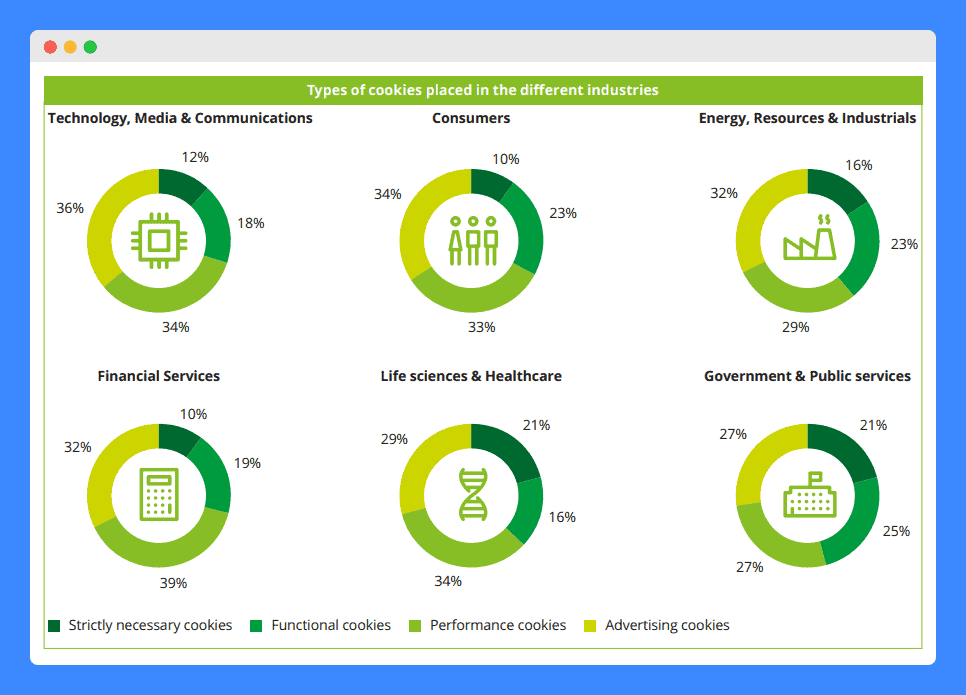
As for third-party cookies, most are performance cookies, aiming to collect browser share statistics and other performance metrics.
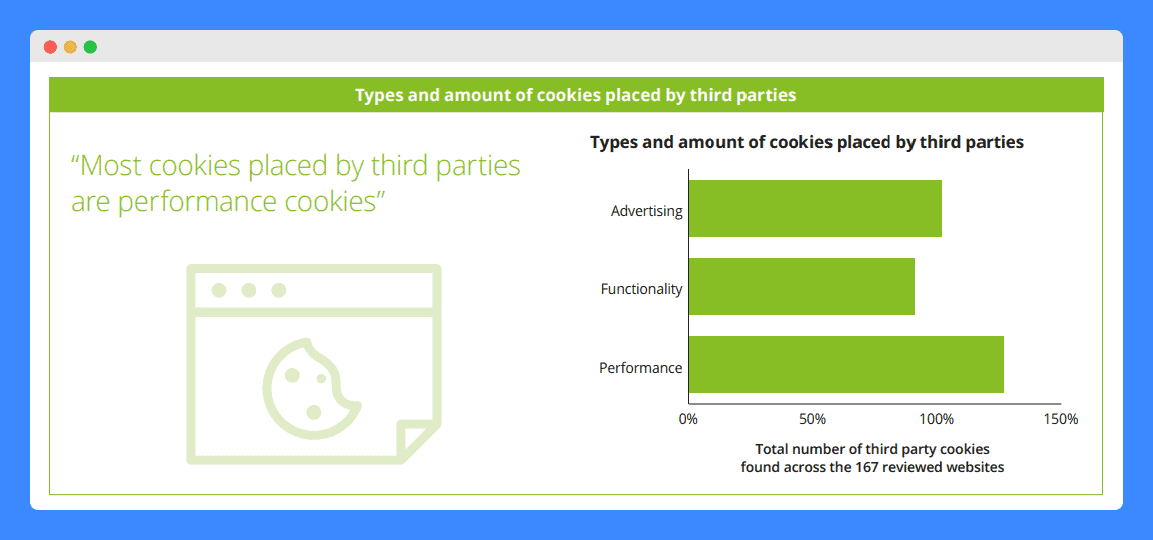
Many websites use cookies because they are effective. Tailoring your strategy based on these numbers will allow you to implement targeted advertising and better performance optimization.
How Do Websites Notify Users About Cookies?
Websites primarily notify users about cookies through visible alerts, ensuring transparency and compliance with online privacy regulations.
According to recent statistics on cookies, 81% of websites proactively inform users by notifying them about the website’s cookie policy upon their first visit.

This is often achieved through a pop-up or a banner, with 75% of websites opting for banners as the method of communication. These banners typically outline the use of cookies and direct users to the full cookie policy for more detailed information.
Additionally, 43% of websites employ tactics to nudge users towards accepting cookies, often positioning the acceptance option more prominently than rejection or customization options.
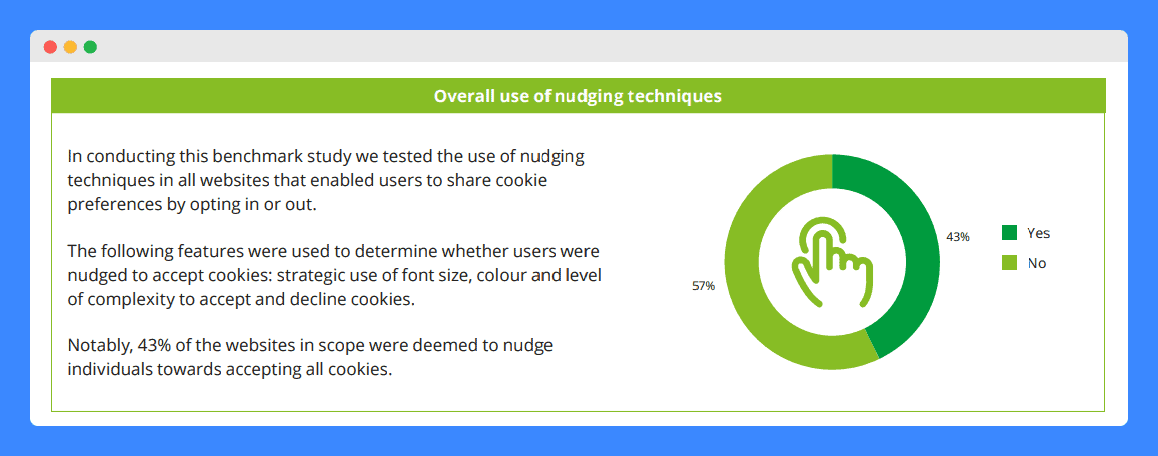
That said, only 12% of websites provide a straightforward method for users to opt out of certain categories of cookies, reflecting a limited degree of user control over their personal data.

These cookie trends indicate a strong emphasis on user engagement and compliance while balancing the need for effective data collection strategies.
The high usage of banners and notifications not only aligns with legal requirements but also plays a crucial role in maintaining transparency and trust with users concerning their data privacy.
How Do Website Visitors Respond to Cookie Disclosures?
Most website visitors have a passive response to cookie disclosures. For instance, just a month after GDPR was implemented in 2018, statistics revealed that 76% of all website visitors ignored the cookie banner when it appeared.
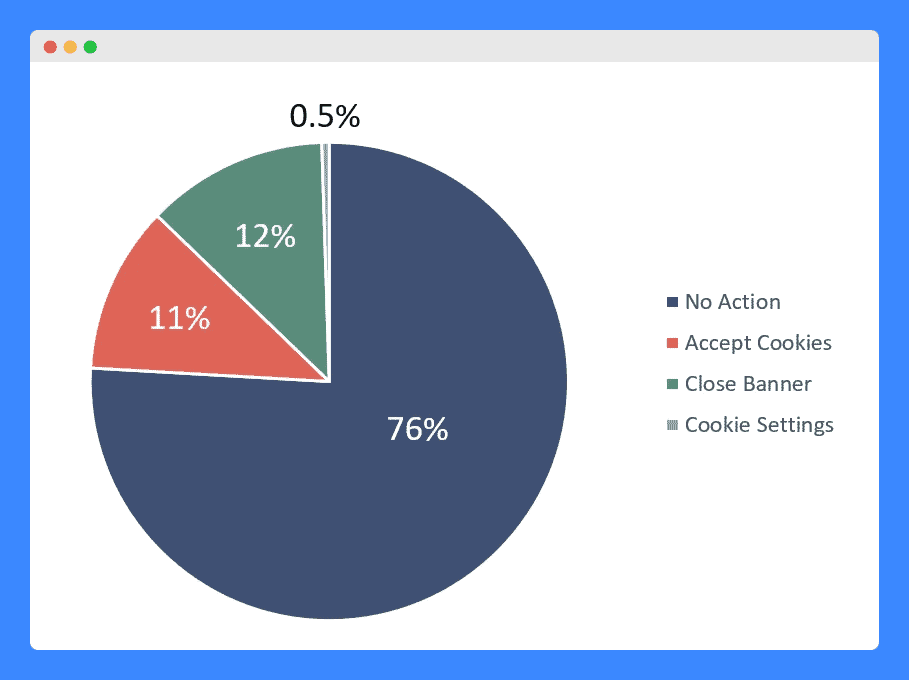
This indifference suggests a level of acceptance or resignation regarding the presence of cookies but also indicates potential oversight on the importance of cookie consent.
In the U.S., a more proactive stance is noted. In a 2021 survey, 9% out of 5,400 adults say they feel compelled to refuse cookies, highlighting a growing awareness and concern for online privacy.
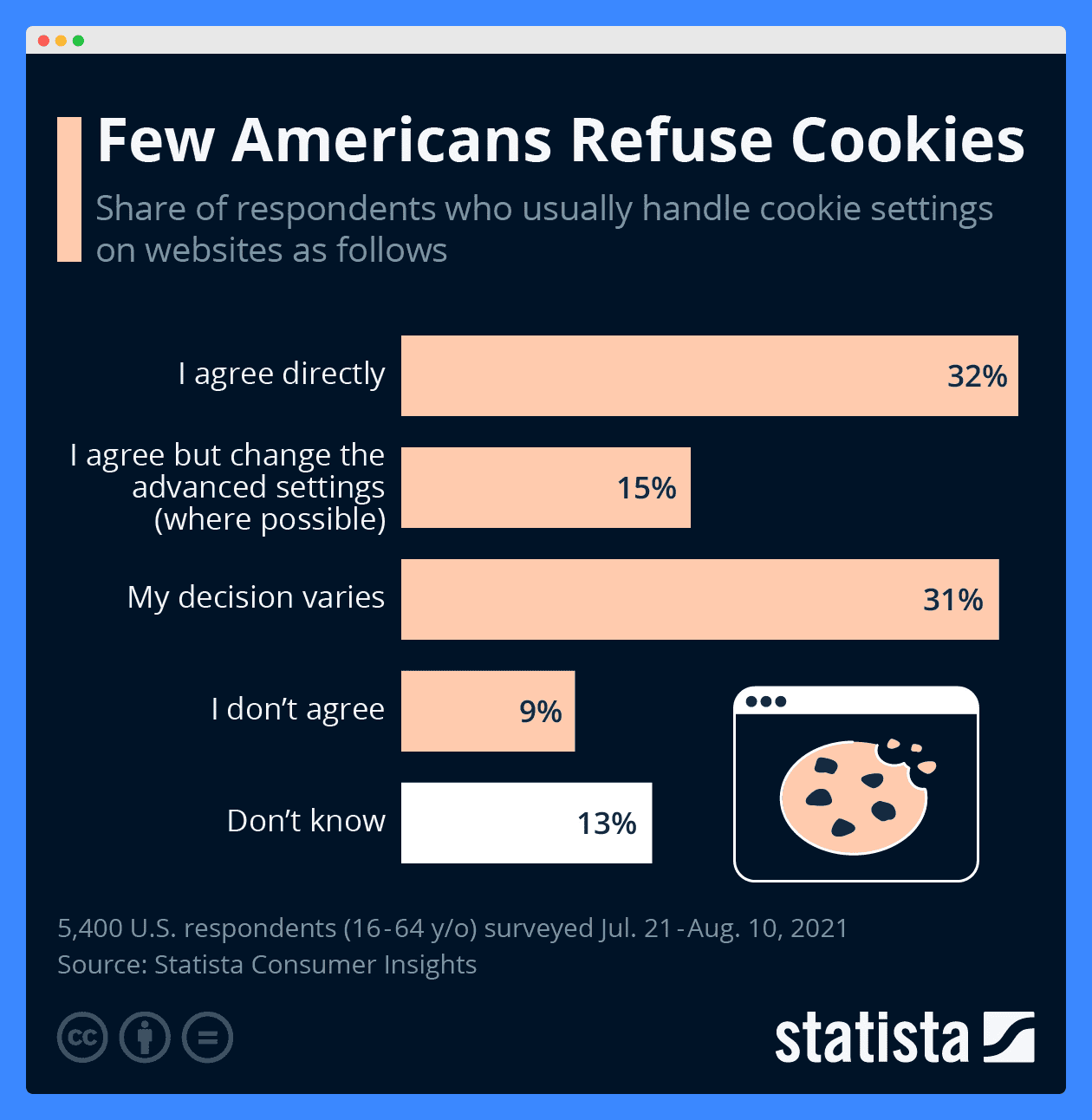
In regions covered by the General Data Protection Regulation (GDPR), such as Poland, Spain, the UK, and Sweden, consumers are more likely to agree to cookies, influenced by the stringent privacy frameworks.
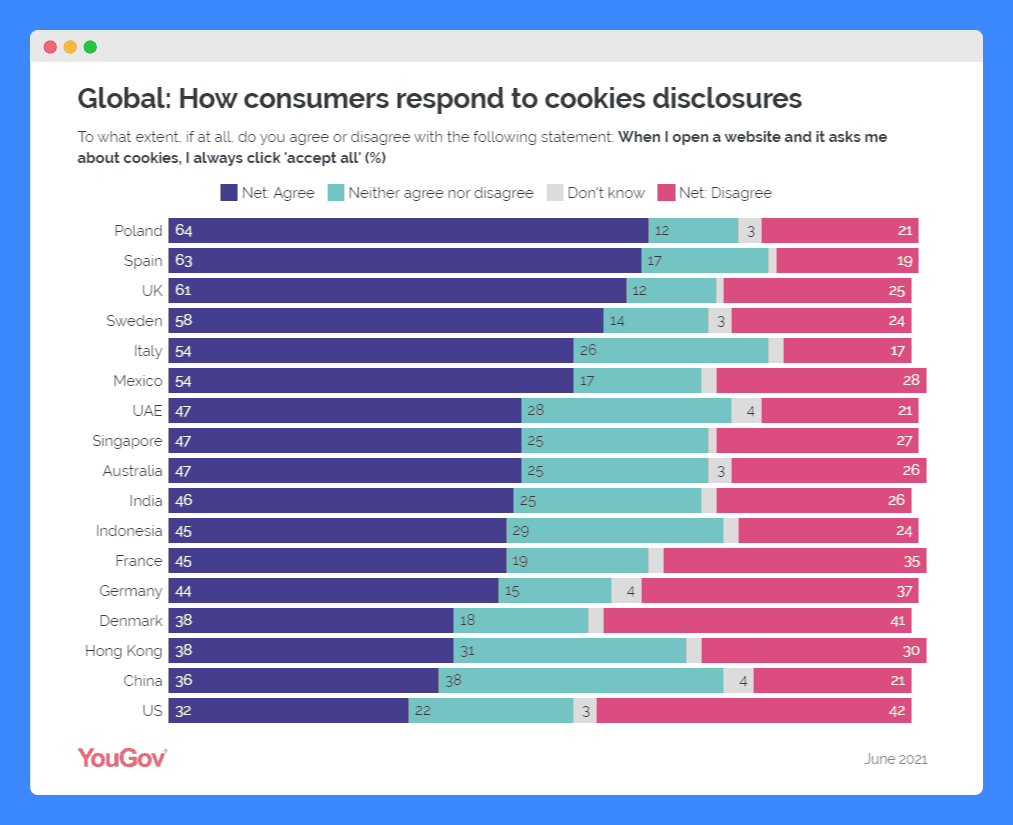
This survey was done in June 2021. By 2022, around 37% of users in France said they accept cookies “regularly.”
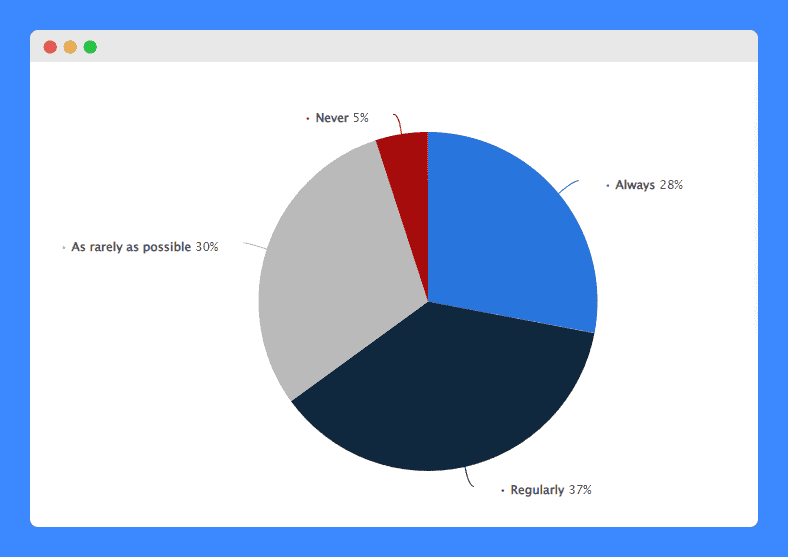
In the United States, the highest acceptance rate of cookies stored occurred among those aged 25 to 34, with 32% of these users consistently accepting cookies.
For online business owners, these insights can be crucial for optimizing the browsing experience by providing personalized content.
By understanding user concerns, you can ensure informed consent and avoid the risk of data breaches. Remember, a user who feels empowered to control their data is more likely to engage with your website and become a loyal customer.
PRO TIP: Understanding the attitude of a respondent to cookies can help tailor your strategies. For example, simplify the language of the cookie policy or make the acceptance process more transparent to enhance consent rates.
Do Users Understand Internet Cookies?
No, the majority of users do not fully understand internet cookies. In a 2022 survey, only 28% of 1,100 internet users in America said they completely grasped how internet cookies work, highlighting a significant knowledge gap.
This lack of understanding extends globally, as evidenced by the fact that 56% of Australians who accept cookies are unaware of their role in digital advertising. This confusion can lead to misconceptions about data collection and the management of their online behavior.
It’s important for users to be informed, as this knowledge directly impacts their interactions with a website and their privacy.
On the other hand, online business owners can leverage this knowledge gap to their advantage by enhancing transparency and education around internet cookies and privacy.
By clearly explaining what cookies are, how they are used, and their benefits, businesses can demystify this aspect of browsing. This not only aligns with evolving cookie trends but also builds reassurance among consumers.
Furthermore, providing straightforward tools and options for cookie management can make users feel more in control of their data.
As this awareness grows, those who are better informed may become more receptive to cookie usage, particularly when they understand its role in personalizing and enhancing their browsing experience.
How Internet Cookies Affect Businesses
Internet cookies are crucial for businesses, particularly in the realms of marketing and customer experience. A significant 75% of marketing and customer experience leaders in Australia, France, Germany, India, Japan, New Zealand, the UK, and the US heavily relied on third-party cookies to track user behavior and tailor advertising.
Additionally, in 2023, 80% of business leaders say that the deprecation of cookies will negatively impact their operations, underscoring the importance of these tools in current business models.
Digital publishers face substantial financial impacts, too, with reports indicating a 52% revenue loss due to cookie-blocking mechanisms.
These numbers show the critical role cookies play not only in advertising but also in enhancing the overall functionality of online services.
Cookies help websites remember user preferences and can manage items in an online shopping cart, for example, improving the user experience and boosting conversion rates.
The challenge and opportunity lie in exploring alternative data collection strategies that are less reliant on cookies but still effective in gathering crucial consumer insights.
Such a proactive move not only mitigates potential negative impacts but also positions businesses as forward-thinking and customer-centric in their approach to privacy and data use.
PRO TIP: To transition into a cookieless future, invest in first-party data initiatives or adopt new technologies designed for privacy-first tracking.
Frequently Asked Questions
How are cookies used in website analytics?
Cookies aid Google Analytics in collecting data on site usage and visitor patterns. As such, cookies also help optimize website performance.
What do internet cookies track?
Websites use cookies to track user behavior via their web browser, logging data like site preferences and login status. They monitor browsing habits.
How do cookies impact user privacy?
Cookies enable extensive data tracking, often collecting personal information without explicit user consent. This can compromise privacy.
How can users manage cookies?
Users can adjust settings in their internet browser to prevent or limit cookies if they know that cookies track their activity.
How do cookies affect website performance?
Cookies speed up website loading and user experience. When users reject cookies, they reduce personalized ads and negatively impact advertiser targeting.



